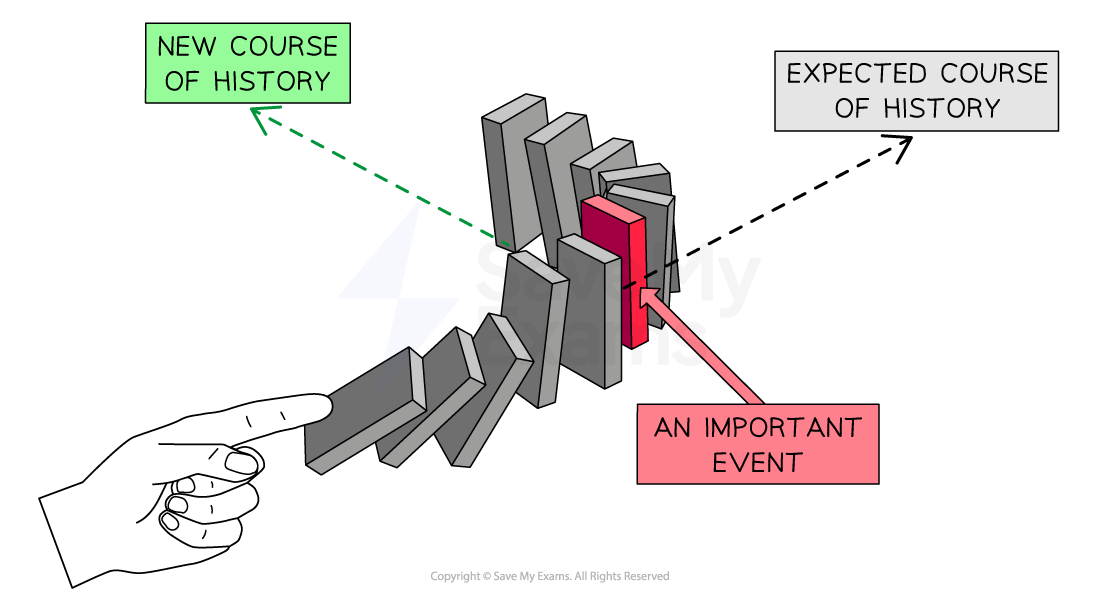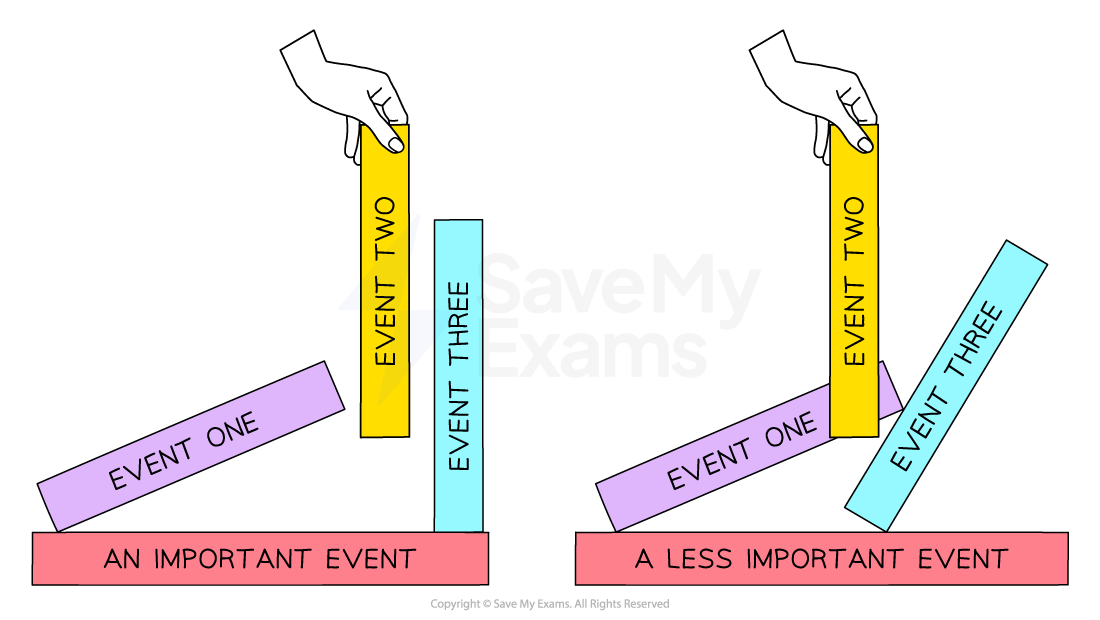The 16 Mark "Explain the Importance of " Question (Edexcel GCSE History): Revision Note
Exam code: 1HI0
Summary of Question 3
Question 3 requires you to explain why a particular event was important for a key theme, such as relations with the Indigenous peoples
You’ll be given three options
You must answer two
Each option is worth 8 marks
This question will require you to use second-order concepts in your answer
Amount of marks | 16 (2 x 8 marks) |
|---|---|
The time that you should spend on the question | No more than 25 minutes |
An example of the type of question you may encounter can be seen below:

In previous years, this question has focused on the following topics from the American West:
Year of Exam | Question Topic |
|---|---|
2018 (opens in a new tab) | Option one: The Indigenous peoples' (Plains Indians) beliefs about land and nature for relations between Plains Indians and settlers Option two: The Timber Culture Act (1873) for the settlement of the Plains Option three: The Johnson County War (1892) for relations between homesteaders and cattlemen |
2019 (opens in a new tab) | Option one: Changes in ranching for the cowboys’ way of life Option two: The Exoduster movement (1879) for the growth of settlement Option three: The extermination of the buffalo for the Indigenous peoples' (Plains Indians) way of life |
2020 (opens in a new tab) | Option one: The Indian Appropriations Act (1851) for the Indigenous peoples' (Plains Indians) way of life Option two: The Oregon Trail for early migration to the West Option three: The Civil War for settlement in the West |
2021 (opens in a new tab) | Option one: The expansion of the railroads for settlement in the West Option two: Gold prospecting for conflict with the Indigenous peoples (Plains Indians) Option three: New farming technology for farming in the West |
2022 (opens in a new tab) | Option one: The Gold Rush (1849) for migration to the West Option two: The US federal government for dealing with law and order Option three: Red Cloud’s War (1866–68) for relations between the Indigenous peoples (Plains Indians) and the US government |
2023 (opens in a new tab) | Option one: Horses for the Indigenous peoples' (Plains Indians) way of life Option two: John Iliff for ranching on the Plains Option three: The Battle of the Little Big Horn (1876) for US government policy towards the Indigenous peoples (Plains Indians) |
2024 | Option one: The railroad network for the cattle industry Option two: The Sand Creek Massacre (1864) for relations with the Indigenous peoples (Plains Indians) Option three: Sheriffs and marshals for law and order after 1876 |
How to explain importance
Importance is a key second-order concept in history
Second-order concepts allow you to:
Understand history
Have a complex explanation
Historical importance is often subjective
Each historian brings their own opinion on what events or people are important
Importance is decided using hindsight. An event is considered important if it:
Created new ideas
Directly changed events at the time
Affected large groups of people
Impacted key themes of the time period, such as:
Relations with Indigenous peoples
Law and order
Had important long-term impacts that can be seen today
To understand importance, visualise a set of falling dominoes
An important event, development or person changes the direction of all of the dominoes that come after it

Imagine the set of dominoes again
An important development, event or person, when taken out of the sequence, stops other dominoes from falling
If it is less important, it does not stop the dominoes from falling

How to answer an "Explain the importance of" question
You must only select two of the three options
If you answer one of the questions, you will only be able to achieve a maximum of 8 marks
Choose the two options where you can:
Recall accurate, specific knowledge
Explain why that event mattered for the theme
Give two developed points per answer
Examples of themes for the question are:
Relations between different groups in the American West
A few examples of this theme include the US government and the Indigenous peoples; cattle ranchers and homesteaders; white settlers and Chinese migrants
Migration
Did the event increase or decrease migration to the West?
Settlement
Did the event increase or decrease the settlement of the American West by migrants?
Ways of life
How did the event affect how the specified group lived and worked?
Key developments in the American West
A few examples of this theme include the cattle industry; the railroads; homesteading; law and order
If you do not explain the importance of the event to the key theme in the question, you will be limited to 2 marks for each option that you answer
"Explain the importance of" question structure
Your answer should include:
Specific relevant knowledge
Complex explanations showing:
How the event impacted the key theme in the question
How important the event was in the development of the American West
Your answers could be written in PEE paragraphs:
P — Make a point about the question
E — Include evidence to support the point you have made (K)
Focus on the event mentioned in the question
E — Explain the question (SOC)
Focus on the key theme of the questions
Include a complex explanation showing your understanding of the importance
To achieve full marks for one option, you should aim to write two paragraphs
4 marks for each question are awarded for knowledge (K)
4 marks for each question are awarded for your analysis of second-order concepts consequences and significance (SOC)
Be sure to:
Put a cross in the box next to your chosen option
Answer in the correct space on the paper
Only answer two options
You will not have time to answer all three options, and you will not get any extra marks for doing so

Worked example of an "Explain the importance of" question
Worked Example
Explain two of the following:
The importance of President Grant’s ‘Peace Policy’ (1868) for changes in the way of life of the Indigenous peoples (Plains Indians) (8)
The importance of the Goodnight-Loving Trail for the development of the cattle industry in the 1860s (8)
The importance of sheriffs and marshals for law and order after 1876 (8)
(Total for Question 3 = 16 marks)
Answer
Indicate your FIRST choice on this page.
Indicate which question you are answering by marking a cross in the box. If you change your mind, put a line through the box and then indicate your new question with a cross.

President Grant’s ‘Peace Policy’ was important for changes in the way of life of the Indigenous peoples because it reduced corruption in reservations (SOC). The Peace Policy replaced corrupt reservation agents with religious men (Quakers) with strong reputations for fairness and justice (K). This was important for changes in the way of life of Indigenous peoples because corrupt reservation agents had caused hardship in reservation life. Agents and local traders had cheated the Dakota Sioux for a long time before Little Crow’s War. As a result, the Indigenous peoples were treated more fairly in reservations, slightly improving their standards of living (SOC).
The Peace Policy also changed the Indigenous peoples' way of life because it encouraged them to assimilate into white American society (SOC). For example, Indigenous children were sent off the reservation to go to school where they were taught about white culture and not allowed to continue their traditional way of life (K). This was important because it made it harder for young people in the tribe to learn the traditional skills of their tribe. The schools also encouraged them to become Christian, so they would be considered more civilised by white settlers. This led to a complete loss of some Indigenous tribe's language and traditions (SOC).
Indicate your SECOND choice on this page.
Indicate which question you are answering by marking a cross in the box. If you change your mind, put a line through the box and then indicate your new question with a cross.

The Goodnight-Loving Trail helped to develop the cattle industry because it showed the benefits of trading directly with Indigenous tribes (SOC). In 1866, Goodnight and Loving created the trail so that they could reach the Navajo's reservation. When they got there with 2,000 cattle, they sold the cattle for four times more than they could have sold them in Texas for (K). This developed the cattle industry because it opened up more markets for cattle ranchers to sell their cattle too (SOC). If cattle ranchers could develop positive relations with an Indigenous tribe, they could make a significant amount of profit and ensure that there was always a demand for their cattle.
The Goodnight-Loving Trail also helped develop the cattle industry because it supported the development of Wyoming (SOC). The Goodnight-Loving Trail ended at Cheyenne in Wyoming. The success of Goodnight and Loving's use of the trail encouraged other cattle drivers to use the trail. As a result, Cheyenne grew and Wyoming, in general, developed a successful cattle industry (K). This helped the cattle industry because it created more hubs from where cattle could be transported across America, especially to the North where cattle were worth more money. This encouraged more people to become cattle ranchers or cowboys, growing the cattle industry in the 1860s and 1870s (SOC).

Unlock more, it's free!
Was this revision note helpful?
